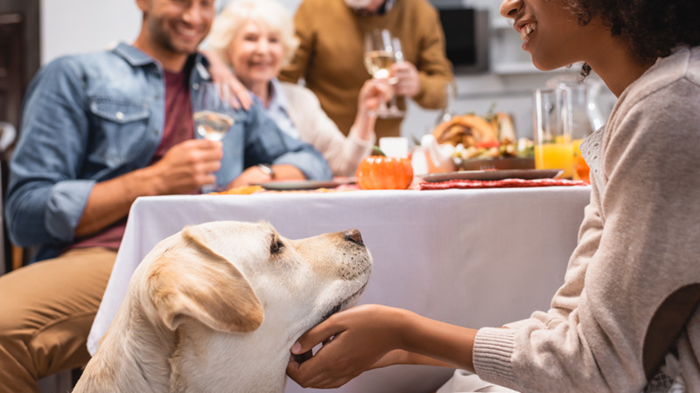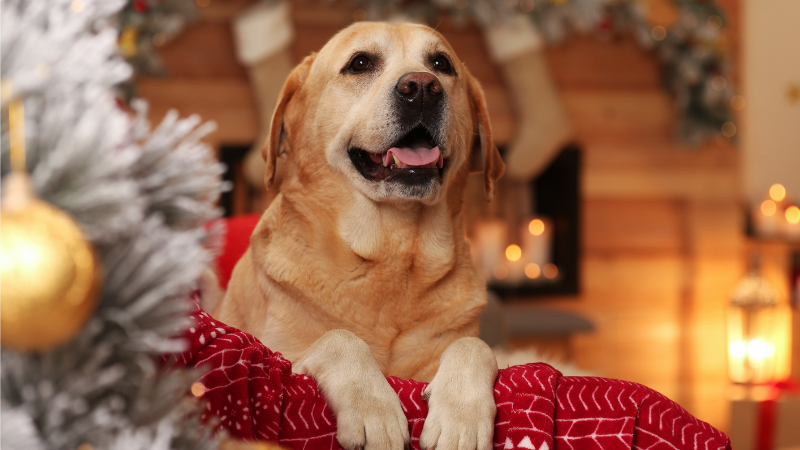
The holiday season is in full swing! It’s time to get out the decorations, start baking treats, and making plans with friends and family! But don’t forget your dog’s safety when preparing for the festivities!
No matter how big your gathering may be, there are plenty of holiday hazards to watch out for around the house. When family and friends come calling, consider added dangers that your dog might face!
The tips below will help reduce your canine family members’ stress while keeping them safe this holiday season!
4 tips for keeping your dog safe during the holidays!
Most human foods aren't safe for dogs - even during the holidays
If your dog sees a holiday feast, they’re very likely to make their way under the dinner table. A head might peek out, a tongue might go for a lick, or a lap may find itself filled with a hungry dog with an agenda.
Before sitting down for a festive meal, make sure to review what foods are dangerous for dogs to eat. Several toxic foods and drinks will be present, but not everything is off limits.
Feeding table scraps isn’t recommended for several reasons. As a rule of thumb, human food should only make up a maximum 10% of a dog’s diet. Foods that have high fat and salt contents should be avoided entirely. Dogs who are “used to table food” are usually overweight because their owners are simply unaware how much food their dog is being fed.
If you decide to allow your dog to eat table scraps, don’t feed more than usual because you’re eating more than you would normally eat. If your dog is getting more food at the table, and the same amount of dog food, then you risk causing diarrhea or vomiting from overfeeding.
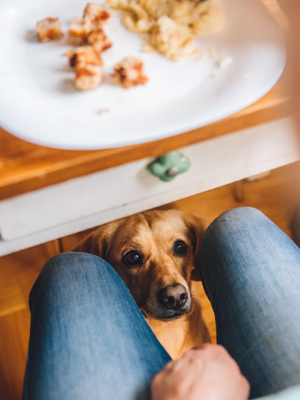
Pancreatitis is a condition frequently seen by vets during the holidays despite of their owners best efforts. What may seem like a ‘healthy scrap,’ is almost always too high in fat and salt for dogs and cats.
Your guests may not be used to ‘puppy dog eyes.’ Auntie Brenda will look at that face and think ‘how could I possibly say no?’ and then feed your dog a big forkful of garlic mashed potatoes. As the dog owner, it’s best that you do not give your guests permission to feed your pet anything to avoid mistakes that may make your pup sick.
Festive foods and drinks to avoid are:
- Onions and garlic
- Alcohol
- Fat trimmings
- Yeast dough (found in some buns)
The following festive foods are safe in small amounts, without added butter, salt or sauces:
- Turkey broth, not gravy
- Brussel sprouts
- Carrots
- Chicken and Turkey (not on the bone!!)
- White fish
The kitchen - you dogs' dream, but a holiday safety nightmare
If you’re in the dining room and your dog isn’t under the table, they may be feasting in the kitchen. If you’ve left out cleaners, uncooked foods, or uneaten foods on the counter, you could be setting up the worst-case scenario for your dog.
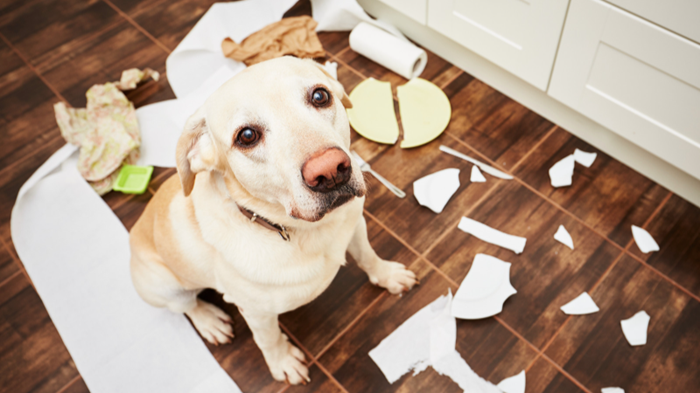
In the kitchen poultry bones could be located on the counter or loosely tossed in the garbage. Given how dangerous they are, make sure to have a garbage can that is inaccessible to pets, and make sure uneaten food is out of reach.
Poultry bones are the worst festive foods that dogs can get a hold of.
When cooked, bones become brittle, and combined with the generally small size there are a lot of risks which include:
-
Obstructions in the throat
-
Obstructions in the intestinal tract
-
A scratched esophagus or intestines
-
Blockages that require surgery
-
Mouth injuries
The following ingredients found in desserts that are dangerous to dogs are:
-
Grapes and raisins
-
Macadamia nuts
-
Xylitol (artificial sweetener)
-
Chocolate – especially dark and bakers chocolate.
-
Fruit pits or seeds
Leaving your foody gifts on display could hurt your dog
A prominent display of gifts helps fill any home with holiday cheer. Many of those gifts are full of food. Which are wonderful! Keep in mind if you have a dog that can sniff out the treats and tear open packaging with reckless abandon, it may spell disaster.
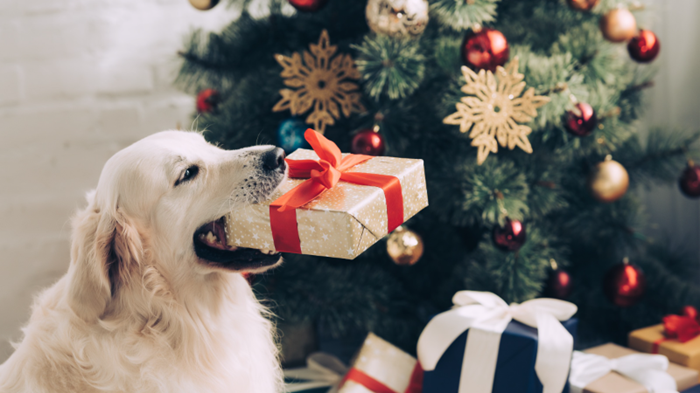
Like desserts in the kitchen, many sweets like chocolate, sweeteners, nuts and raisins are often found in packaged treats. Chocolate contains both theobromine and caffeine, which are toxic to dogs and cats. Seizures, abnormal heartbeats, and in extreme cases, death can happen if chocolate is eaten by dogs.
While all chocolate is dangerous, Higher cacao chocolates like dark chocolate and baker’s chocolate are the most dangerous because they contain more theobromine and caffeine.
If you have a dog that just won’t leave foody gifts alone, it may be best to put your gifts away. Store gifts in a closet or other area of your home where they can’t be reached until it is time to bring them out.
Festive Foliage Safety
Plants play a large part in making your home festive! They are hung, put on tables, trees, the floor, and come in many varieties. Plants are prominently displayed all over, but not all are safe for pets. In some cases the reaction to eating part of a plant is mild, but others lead to more severe problems.
If you’re planning to bring plants into your home this year, or even if your receive a plant as a gift, remember to do your research before putting it somewhere your dog can get at it.
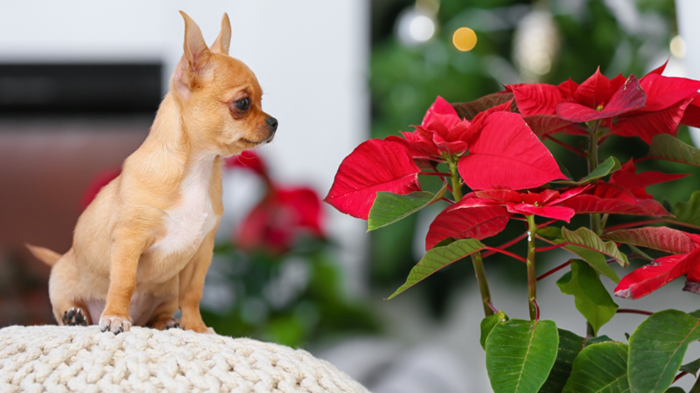
Did you know some plants are treated with pesticides and other chemicals to extend their life and colour over the holiday season? Even if you are bringing an animal-safe plant into the house, check for these treatments in order to avoid severe reactions that may include seizures, coma, or death.”
Poinsettias represent the holidays for many of us. Although they rarely cause severe reactions, the leaves and flowers can still cause burning in the mouth and throat, nausea, and vomiting when ingested.
Other holiday plants to keep away from your dog include:
- Holly and mistletoe
- Lilies and daffodils
- Amaryllis
- Christmas Cacti
- Christmas trees
In Summary
The holiday season can be very busy, so plan early to ensure our dogs don’t take a backseat to the rest of the festivities! Follow the tips above to keep your dog safe and happy.
Above all else, remember that there are things that should be kept out of your dog’s reach. Check in with your dog’s behaviour, appetite, and potty habits. If you notice anything our of the ordinary, reach out early to your local veterinary staff to ensure your dog’s best health.
The staff of Petsecure wish you and your dogs a safe and happy holiday season!
Learn what’s covered by Petsecure and get a free quote today!

